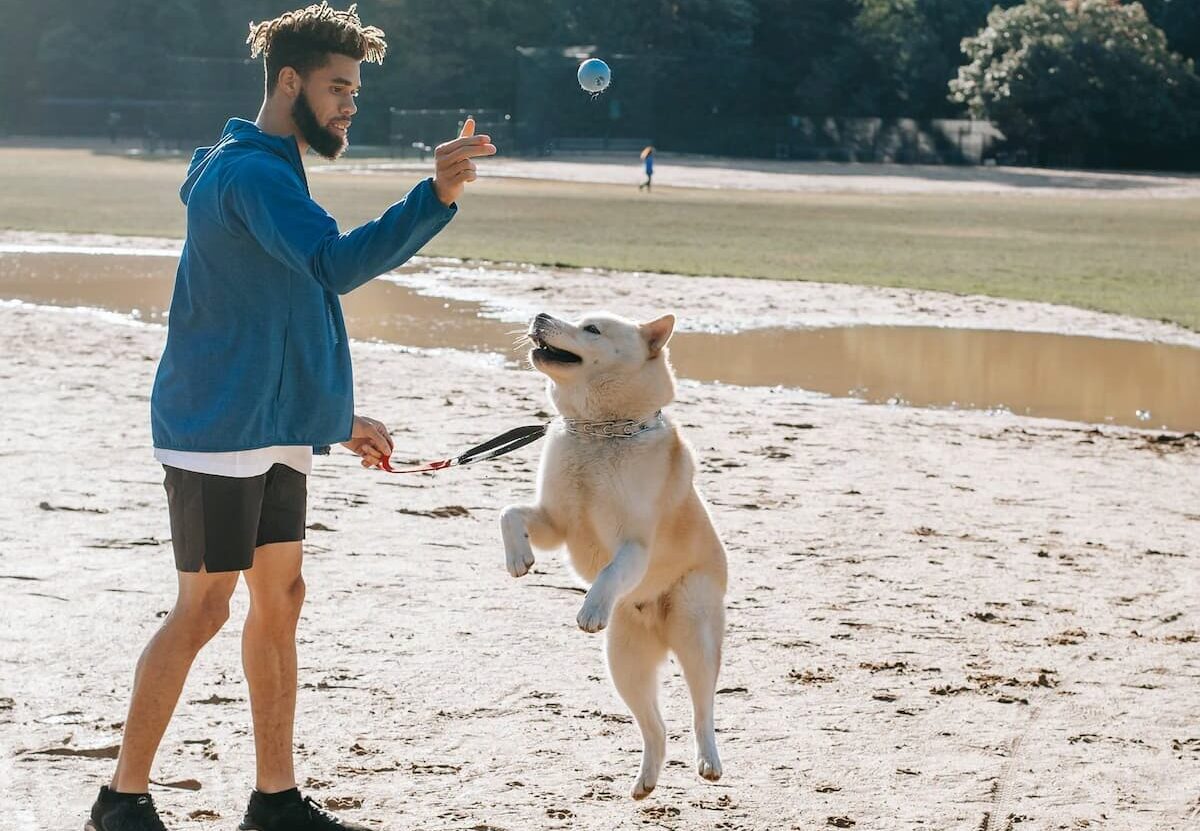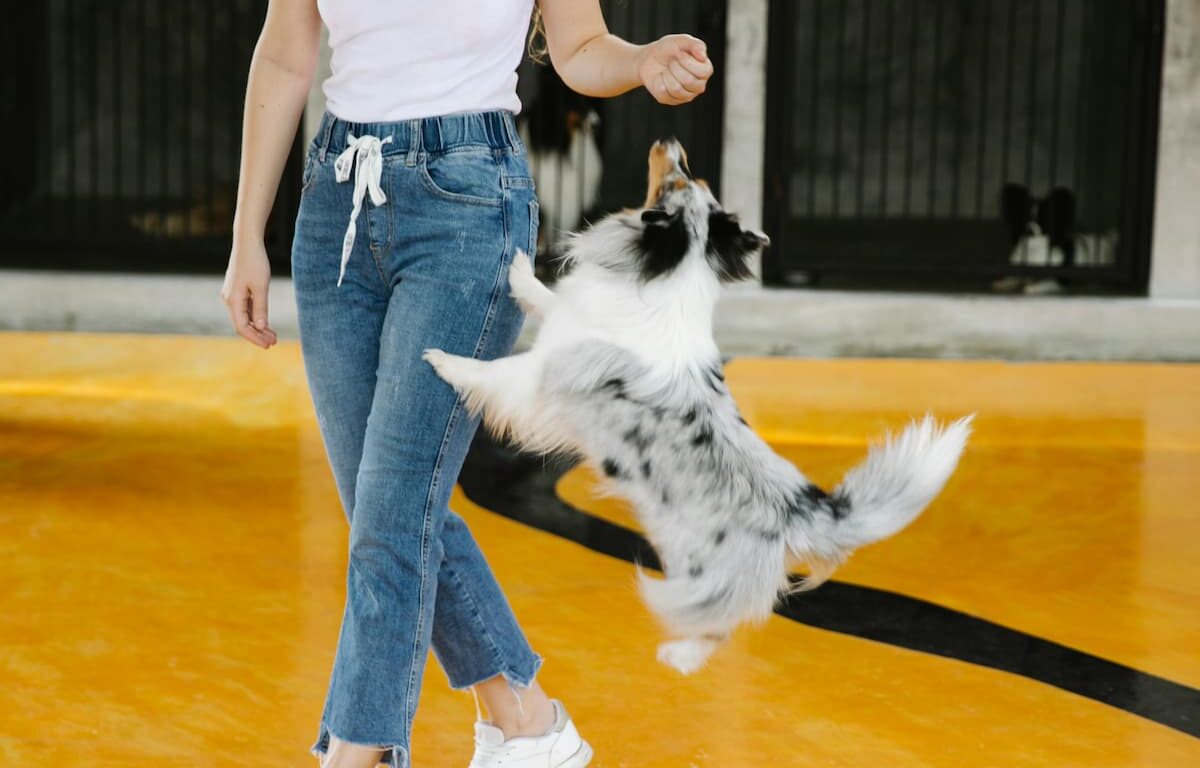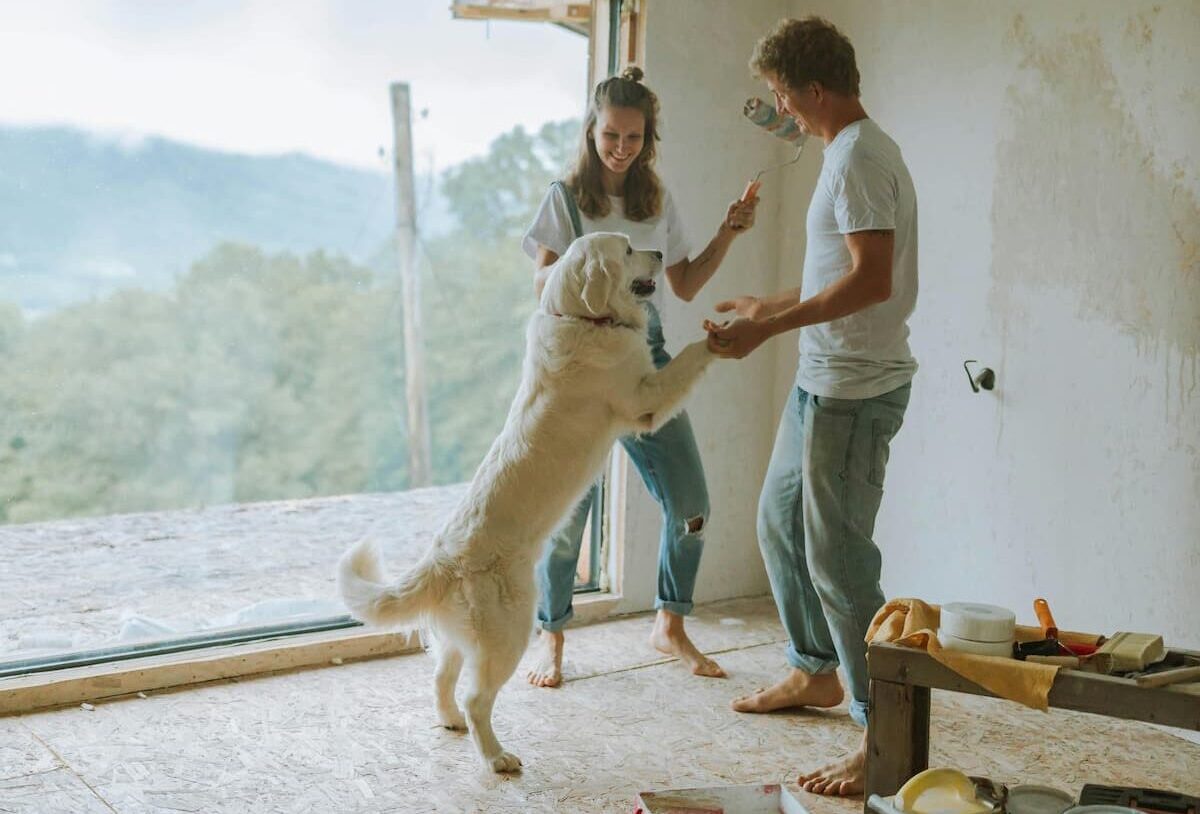Have you ever come back home after a long day at work, hoping to finally get some rest, only for your energetic canine companion to leap onto with boundless enthusiasm.
Have you ever wondered: Why do dogs jump on you when you get home?
Is it simply their way of saying “welcome back,” or is there something deeper behind this exuberant display of affection?
This article will answer your questions.
Understanding the Canine Greeting Ritual
Have you ever experienced that heartwarming moment when you step through the front door and your furry friend bounds towards you, enthusiastically jumping up with pure joy?
It’s a sight that warms the soul, but have you ever wondered why dogs exhibit this behavior?
Here are some fascinating reasons behind this exuberant greeting ritual:
It’s All About Making a Grand Entrance
For dogs, jumping up to greet you is their way of saying, ”Hey there, I missed you so much, and I’m thrilled you’re back!”
It’s their version of rolling out the red carpet to welcome you home.
This high-energy display is a reflexive response to the adrenaline rush they experience when they see someone they love and trust.
So, the next time your dog leaps up to give you a big hello, remember that it’s their unique way of showing their unabashed delight.
Getting Up-close and Personal
Beyond their excitement, dogs use physical contact to express their love and establish a connection with you.
Jumping on you allows them to get closer, touch, and intertwine with your personal space.
This tactile experience reinforces their bond with you and provides them with a sense of security and reassurance.
While it can be a bit overwhelming, especially with larger dogs, remember that their intentions are pure and their love for you is immeasurable.
Asking for Your Attention
Dogs are social beings, and their exuberant jumping serves as a way to grab your attention.
They want to ensure that you are fully present with them and acknowledge their presence.
By jumping up, they are signaling that they want to be a part of the action and share in the excitement.
-
- Jumping up allows them to get closer to your face and shower you with slobbery kisses, their way of saying ”I love you!”
-
- Your arrival represents the highlight of their day, and what better way to express their love than through excited jumps and tail wags?
Establishing Dominance
When dogs jump on you, they are instinctively trying to assert their dominance.
In the wild, pack leaders would stand on their hind legs to appear taller and more intimidating.
By jumping on you, your canine companion is essentially saying, “Look, I’m in charge!”
Although this behavior may seem cute and affectionate, it’s important to establish boundaries and discourage jumping to maintain a balanced relationship.
Expressing Unbearable Excitement
Just like humans, dogs have emotions, including and especially excitement.
When you open that door and walk into their line of sight, your presence triggers an exhilarating surge of energy in their adorable bodies.
This feeling is so intense and overwhelming for them that they can’t suppress their enthusiasm.
Their natural response is to communicate their elation by jumping up to greet you with their whole being, tail wagging furiously and tongue hanging out.
-
- The thrill of seeing you after being apart for a while can make their tails wag so hard it seems like they might take off!
-
- Jumping up is also their way of seeking your attention and telling you how much they’ve missed you during your absence.
Effective Techniques to Prevent Jumping Behavior
While it may seem endearing at first, a little understanding about why dogs jump on you when you get home could go a long way in curbing this behavior and promoting good manners.
To teach your dog good manners and prevent jumping behavior, try these tried-and-true techniques:
Consistency is key: Establish a set of rules and stick to them, consistently reinforcing what is acceptable and what is not.
Dogs thrive on routine, and by establishing a clear expectation, they will eventually learn how to greet you without jumping.
Practice calm greetings: Teach your dog an alternative behavior to jumping, such as sitting or offering a paw.
This way, they will learn that calm greetings are rewarded, while jumping is not.
Practice these greetings during training sessions and reinforce with praise and treats.
Ignore the behavior: When your dog jumps on you, resist the urge to engage or push them away.
Instead, turn away from them, cross your arms, and remain still.
By ignoring the behavior and not giving any attention, you are sending a clear message that jumping is not an effective way to interact with you.
Use consistent commands: Establish a command like “off” or ”down” and use it consistently when your dog jumps.
With time, they will learn that this specific command means they need to keep all paws on the ground.
Remember, patience is key when training your dog to curb their jumping habits.
Consistency in your approach and the use of positive reinforcement will help your furry friend understand what behavior is acceptable.
Soon enough, those jumping greetings will be a thing of the past, and you’ll be greeted by a well-mannered, calm doggo at home!
FAQ
Q: So, why exactly do dogs jump on us when we arrive home?
A: To put it simply, dogs jump on us as a form of communication and excitement.
You see, your homecoming means the world to them.
They haven’t seen you all day (or maybe just a couple of minutes, but hey, that feels like forever to them!) and they’re bursting with joy.
Jumping up is their way of showing how much they’ve missed you and how thrilled they are that you’re back.
Q: But couldn’t they just wag their tails or bark instead?
A: You’re right, they could.
And in fact, they often do wag their tails and bark to show their happiness, but jumping is just another way dogs express their exuberance.
It’s like their own special dance move, a bit like us humans jumping up and down when we’re super excited about something.
Q: Is there any other reason dogs jump on us?
A: Oh, absolutely!
Dogs are highly social animals, and jumping can serve several purposes.
Sometimes, they jump to grab our attention, especially if they feel like they’ve been neglected or want some extra playtime.
Pups are clever, and they know that a well-timed jump can quickly get us to notice them.
Additionally, jumping is a natural canine behavior that stems from their wolf ancestors.
Wolves often jump up to greet each other, so our dogs might just be following their instincts too.
Q: How can I train my dog not to jump on me?
A: Ah, now that’s a common challenge for many dog owners.
The main trick here is to teach your pup an alternative behavior that’s equally rewarding.
When you come home and they start to jump, you can try turning your back and ignoring them until they calm down.
Once they have all four paws firmly on the ground, greet them calmly and give them a gentle pat or a treat.
This way, your furry friend will soon learn that waiting patiently gets them the attention they desire.
Q: Are there any risks associated with dogs jumping on people?
A: Absolutely.
While their intentions may be pure, an overzealous jump can sometimes cause injury, especially to children or elderly individuals who may not have the balance or strength to withstand a sudden push.
It’s vital to teach our furry pals the importance of appropriate greetings to ensure the safety of everyone involved.
Q: Can dogs ever outgrow this behavior?
A: Yes, they can!
As dogs mature and receive consistent training, they often learn to control their impulses.
So, even if it seems like your exuberant pup will never outgrow jumping, with time, patience, and ongoing training, they will eventually figure out that a calmer greeting is just as rewarding.
Q: Any final tips for dealing with dogs which like jumping when they see us?
A: Absolutely!
Apart from teaching them alternative behaviors, it’s crucial to provide your dog with plenty of physical and mental stimulation to channel their energy.
Regular exercise, interactive toys, and obedience training can greatly help reduce their desire to jump.
Remember, our furry friends just want to show us how much they love us, so let’s meet their enthusiasm with love, guidance, and a few well-placed treats.
Key Takeaways
When it comes your dogs jumping onto you, it all boils down to three main factors: instinct, excitement, and simply wanting to be close to you.
Dogs are social animals, and their exuberant jumps are a way of expressing their genuine joy at your return.
It might not be the most graceful greeting, but it’s definitely filled with love and enthusiasm!
Next time you walk through that door and your furry friend jumps up to greet you, remember that it’s not because they’re trying to dominate you or assert their position—it’s because they missed you so much!
Instead of scolding them, try redirecting their energy into a more appropriate behavior, like sitting or giving you a gentle paw.
And remember, consistency is key when it comes to training.
With time and patience, your pup will learn that calm greetings are welcomed.
So now you can impress your friends with your newfound knowledge on why dogs have this seemingly odd habit.
Remember, the next time you see a dog bouncing towards you, be understanding and appreciative.
After all, what is life without a little bit of joyful chaos?
Embrace the jumps, the wagging tails, and the wet slobbery kisses, because nothing can compare to the unconditional love of a dog.












